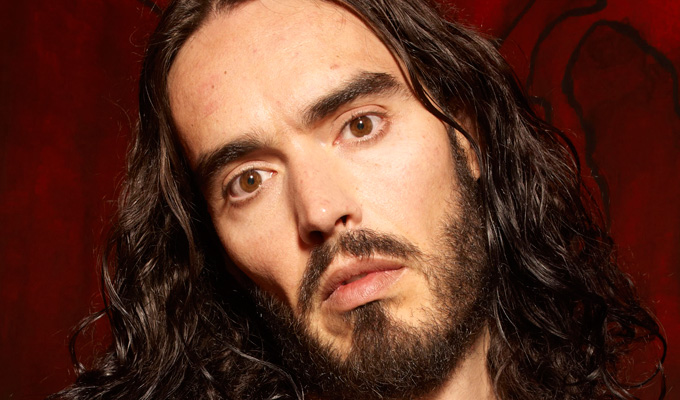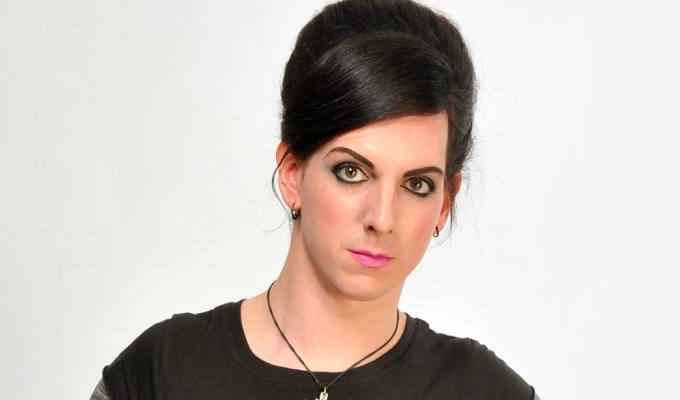
Russell Brand: Messiah Complex
Note: This review is from 2013
Gig review by Steve Bennett at the Birmingham Symphony Hall
It’s almost impossible to discuss Russell Brand without mentioning his image: the hedonistic Shagger of the Century with the Jack Sparrow dress sense and hobo chic that so riles conservative commentators. Everything he does is tabloid fodder: from his celebrity divorce to pointing out Hugo Boss’s shady past.
Amid all the flamboyance and the headlines, it might be easy for a casual observer to forget that he’s actually a comedian – either because rabble-rousing elements of the press never countenance the idea that he might be joking with the outrageous things he sometimes says; or possibly because he performs stand-up so rarely. Messiah Complex is his first UK tour since 2009’s Scandalous, when he washed up on stage, a bedraggled but defiant castaway from the shipwreck that was Sachsgate.
This time around we see a more mature Brand. Not quite so much an an ostentatious, attention-grabbing sideshow in the media carnival but a bright man with a sincere ‘one-world love-and-piece and screw the corporations’ message he wants to use his fame to convey. His charisma – or his libido – cannot be dimmed, but his animalistic sexual energy has been turned down a notch.
Still, you don’t call your show Messiah Complex without a touch of ego. This is Brand’s thesis about the captivating revolutionaries he looks up to – Gandhi, Guevara, Malcolm X and Jesus – and what made them so unshakably convinced that their visions could change humanity. He sees himself as sharing many of the same characteristics, and with an ambiguously tongue-in-cheek approach, links himself to these martyred icons... or is he saying he’s more like all those on the psych ward who merely THINK they are the next messiah?
Aptly the idea of the image overwhelming the message is one of the key themes here. He jokingly invites comparison with Guevara, whose likeness has been purloined by popular culture – even the marketing department of luxury car manufacturers – while his ideals aren’t allowed to persist. Is Brand more than the media projection of himself? Did his unorthodox wardrobe trivialise the considered first-hand evidence he gave the Commons Select Committee on drugs policy? Of course it did.
Or on the flipside, Brand ponders how intense advertising hyperbole imbues ‘fizzy brown drinks’ and mass-produced burgers with significance and ‘values’ they don’t have. Mocking the overblown values of commercials or the inherent creepiness of Ronald McDonald isn’t comedically groundbreaking, of course – nor is his take on the Christian right’s obsession with hating homosexuality over spreading unconditional love – but Brand fits these stand-up tropes as neatly into his worldview as Bill Hicks did.
Brand employs some of the dark arts of the marketeer himself, of course, not least the linguistic grandstanding that helps define his strutting style. But he’s grounded enough to always be aware of his own potential hypocrisy, cheekily mocking his pretense or limited thespian ability. Despite his protests that he *is* a good actor, he can’t pull off a serious face when he appears on Newsnight.
The show is packed with ideas, casually quoting philosophers and thinkers but never to show off, only to more eloquently express the arguments he’s keen to advance. And don’t worry, Brand’s not entirely swapped sex for geopolitical rhetoric, he proves he can be as filthy as the worst of them.
Yes, he sometimes flirts with being more preachy, pious or educational than being funny, but he certainly has a messianic way of holding an audience, able to convince his disciples of the evils of corporate wealth, while accumulating quite a bit of it himself. To maintain such a common touch when he so clearly isn’t the common man is quite the miracle.
Review date: 8 Oct 2013
Reviewed by: Steve Bennett
Reviewed at:
Birmingham Symphony Hall






